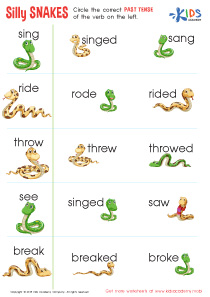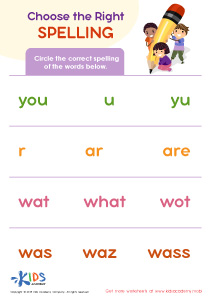Extra Challenge First Grade Rhyming Worksheets
1 filtered results
-
From - To
Grade 1 Free download Extra Challenge Rhyming Worksheets
Looking for an extra challenge in your first-grade phonics lessons? Look no further than our Rhyming Words Worksheets! In this engaging bundle, your students will explore the world of rhyming words, building their phonemic awareness and literacy skills. Each worksheet is carefully crafted to ensure maximum learning and enjoyment for your young students, with a variety of activities and exercises that reinforce foundational reading skills. Whether you're looking to supplement your current phonics curriculum or simply give your students a fun new challenge, our Rhyming Words Worksheets are the perfect addition to your teaching arsenal.


Baa Baa Black Sheep Printable
The Benefits of Extra Challenge Worksheets on Phonics Rhyming Words in Grade 1
Phonics is the foundation upon which early reading skills are built. And there's no better way to strengthen phonemic awareness than through rhyming words. That's why Extra Challenge worksheets on Phonics Rhyming Words are so useful in Grade 1.
Rhyming words worksheets are an excellent way to engage young learners by helping them develop essential phonological awareness skills. Phonological awareness entails the ability to identify and manipulate sound structures in oral language, such as syllables, phonemes, and word stress. Rhyming words worksheets enable students to identify rhyming patterns in words, which involves the matching of the vowel and consonant sounds at the end of words.
Extra Challenge worksheets on Phonics Rhyming Words offer a structured approach to learning and reinforce conceptual understanding. They provide students with numerous opportunities to practice and reinforce conceptual understanding through various activities like rhyming games, puzzles, and worksheets. These resources cater to varied learning styles, ensuring that each child has access to the materials they need to succeed.
For teachers, Phonics Rhyming Words Worksheets are a convenient tool for building lesson outline and promoting student engagement. With the current trend in blended learning, teachers can also use these worksheets to deliver learning materials online or in-person.
Extra Challenge worksheets on Phonics Rhyming Words also encourage independent learning. When students work on these exercises independently, they get an opportunity to develop critical-thinking, problem-solving, and decision-making skills. This stimulates creativity and builds confidence.
Using these worksheets in classroom lessons can reinforce learning for students of all abilities. They also provide opportunities for differentiation, allowing teachers to engage and challenge students with different needs and abilities. For example, for those who find it difficult to identify similar sounding words, teachers can scaffold learning by introducing such students to word families. Word families are groups of words that share common phonetic sounds. By grouping related words, students learn to identify rhyming words with similar sounding consonants and vowels.
For students struggling with reading fluency, Extra Challenge Worksheets on Phonics Rhyming Words create isolated word drills that reinforce essential rhyming skills. These drills give students an opportunity to practice decoding and fluently reading lesser-known words.
In conclusion, Phonics Rhyming Words Worksheets are an effective and convenient way to promote phonemic awareness in Grade 1 students. With clear phonemic awareness, students develop the foundational skills to become proficient readers.

 Assign to the classroom
Assign to the classroom







